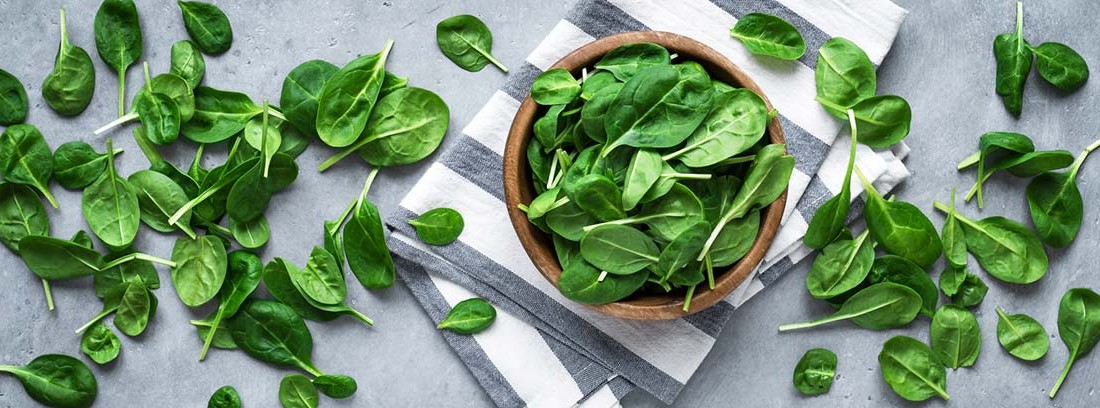Benefits of spinach

Nutritional composition of spinach
Spinach is a vegetable that belongs to the Quenopodiaceae family. Two different varieties are grown globally. The curly leaf variety, which is usually eaten fresh and grows well in the winter months. And the smooth-leaf variety, which is consumed frozen or canned and whose consumption is more widespread throughout the year. Its flavor is slightly acidic, but pleasant.
They are co mainly composed of water and a low content of carbohydrates and fats, it is also one of the vegetables with the highest content in protein. On the other hand, the amount of fiber is not negligible and stands out for its amount of vitamins and mineralsAmong the vitamins, folates, vitamin C and provitamin A stand out. magnesium and potassium.
Protein
Spinach, within vegetables, stand out for having a high value from protein which are the nutrients that participate in more functions in the body: they form tissues, fight against "invaders" that want to enter the body, transport vitamins ...
Fiber
Spinach provides so much fiber soluble as insoluble. Insoluble fiber adds bulk to the stool and helps food pass through the digestive tract faster. Soluble fiber is one that captures water, forming a bulky gel-like substance that aids in digestion, softens and helps eliminate stool.
Vitamin A
Vitamin A is necessary for the proper functioning of the retina and especially for the night vision or in low light and for the good condition of the skin and mucous membranes. In addition, it participates in the formation and maintenance of teeth, soft tissue and bone. It is found in two ways in food, retinol and carotenoids.
Folic acid
Also called folates or vitamin B9, is involved in the production of red blood cells, in the development of the nervous system, participates in the synthesis of genetic material and in the formation of antibodies. In addition, it is very important when it comes to preventing anemia and spina bifida in pregnancy.
Vitamin C
Vitamin C is an antioxidant that helps fight those produced in the body for different reasons. In addition, it is necessary for the growth and repair of tissues, forming proteins that make up the skin, tendons, ligaments ... It helps in the wound healing and participate in the iron absorption.
Magnesium
It is responsible, among other functions, for maintaining proper functioning of the intestines, muscles and nerves, it also participates in the regulation of cardiac contraction, improves the immune system, and is also part of bones and teeth
Potassium
Indispensable for transmission and generation of the nerve impulse, participates in muscle contraction, as well as in the water balance both inside and outside the cell. One of the consequences of loss of electrolytes due to dehydration it may be to suffer cramps.
Health benefits
- Antioxidant action: Thanks to beta carotenes, vitamin C, glutathione, etc.
- Being overweight or obese: Thanks to their low caloric value, they become an ideal food to aid in weight loss.
- Pregnancy: Its high content in folic acid makes it a very suitable food for pregnant women, as it helps prevent, among other things, the.
- Constipation: The fiber present in spinach helps prevent and improve constipation, and they also have laxative properties.
- Eye care: Retinol is essential for adequate vision, it participates in the formation of the rhodopsin, a fundamental pigment of the retina, which is the sensitive layer of the eye, thanks to which we can see images. In spinach the lutein and zeaxanthin help prevent loss of vision caused as a result of the degeneration of the macula of the eye and act as protectors against the development of.
Risks of spinach in babies and young children
Nitrates are found naturally in vegetables, especially green leafy vegetables such as spinach (also lettuce, chard or borage). The nitrates themselves are relatively slightly toxic but in high concentrations, they can causemethemoglobinemia, whose most characteristic sign is the cyanosis.
This disease especially affects those babies and young children who are exposed to high concentrations of nitrates through the diet, often called "blue baby syndrome".
Spinach has a high content of nitrites, exceeds the daily amount recommended by the WHO, therefore they must avoid in babies 0 to 12 monthsIn the case of offering them, it should never exceed 20% of the amount of the dish. From one year to three years this vegetable should not reach or exceed the daily ration. Neither should they be kept at room temperature once cooked, either whole or pureed, and if they are not consumed they should be kept in the refrigerator or freezer.
- Their high content of folic acid makes them a very suitable food for pregnant women, as it helps prevent, among other things, spina bifida.
- Spinach is high in nitrites, so it should be avoided in babies from 0 to 12 months. In the case of offering them, it should never exceed 20% of the amount of the dish. From one year to three years, this vegetable should not reach or exceed the daily ration.
- It is one of the vegetables with the most protein. It also provides abundant fiber as well as vitamins and minerals such as folates, vitamin C, provitamin A, magnesium and potassium.
Diploma in Human Nutrition and Dietetics Master in Pediatric Nutrition and Sports Nutrition
(Updated at Apr 14 / 2024)